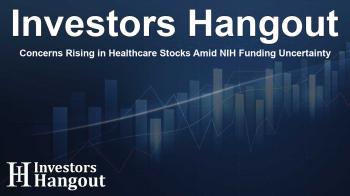Concerns Rising in Healthcare Stocks Amid NIH Funding Uncertainty

Understanding the Impact of RFK Jr.'s Appointment
The recent appointment of Robert F. Kennedy Jr. as U.S. Secretary of Health and Human Services has ignited significant worry in the healthcare sector. Analysts have raised alarms about potential cuts to the funding for the National Institutes of Health.
Decreased NIH Funding
Research funding from NIH grants is crucial for many laboratories across the country. Analyst Kyle Mikson from Canaccord Genuity highlighted the importance of these grants, stating, "Many labs rely heavily on NIH funding for their ongoing research projects. These cuts could create a ripple effect across the industry, leading to uncertainty in healthcare investments."
The Association Between Vaccine Skepticism and Research Funding
With Kennedy’s history of opposing vaccines and questioning the safety of various health initiatives, the potential for funding cuts has analysts worried. Mikson noted, "Kennedy’s skepticism towards vaccines could lead to reduced funding for related research, directly affecting companies that contribute significantly to public health advancements. This skepticism creates instability in the market, prompting investors to reconsider their positions in healthcare stocks."
Current Trends in Investment
Recent trends indicate that healthcare sectors have seen a sharp decline in investments, especially in response to political events impacting policies. From the fourth-quarter 13F filings, healthcare investments dropped by approximately 1.4%. The potential for reduced funding in healthcare could encourage institutional investors to pivot towards technology and financial sectors for stability.
What This Means for Popular Healthcare Stocks
As healthcare costs continue to escalate, combined with Kennedy’s controversial views, major pharmaceutical companies like Pfizer Inc. (PFE) and Moderna Inc. (MRNA) may experience further pressures. These companies, already scrutinized for their vaccine-related products, could face existential challenges should research funding decline further.
Potential ETFs for Investment
Investors might consider exploring healthcare sector-linked exchange-traded funds (ETFs) to mitigate risks posed by potential funding cuts. Some noteworthy options include:
- Health Care Select Sector SPDR Fund (XLV) - Performance: 6.41% YTD
- Vanguard Health Care ETF (VHT) - Performance: 5.79% YTD
- iShares Biotechnology ETF (IBB) - Performance: 4.51% YTD
- SPDR S&P Biotech ETF (XBI) - Performance: 0.19% YTD
- iShares U.S. Medical Devices ETF (IHI) - Performance: 10.36% YTD
Summary of Market Sentiments
The sentiment in the healthcare market could shift significantly as the implications of RFK Jr.'s appointment settle in. Analysts are closely monitoring how these funding changes will sway healthcare stocks, particularly those focused on academic research. As uncertainty looms, cautious investors are reevaluating their strategies, focusing on companies with diversified revenue streams to navigate potential volatility.
Frequently Asked Questions
What is the significance of RFK Jr.'s appointment?
Robert F. Kennedy Jr.'s appointment as HHS Secretary raises concerns about NIH funding, particularly for health initiatives he has publicly opposed.
How does NIH funding affect healthcare companies?
NIH funding is critical for many healthcare companies, particularly those reliant on grants for research and development. Cuts can hinder their operational capabilities.
What trends are observed in healthcare investments?
Healthcare investments have seen a decline recently, with shifts towards technology and financial sectors as investors seek stability in uncertain environments.
Which stocks could be impacted by potential funding cuts?
Major pharmaceutical companies like Pfizer (PFE) and Moderna (MRNA) might face challenges due to their reliance on research that could be affected by NIH funding cuts.
What ETFs can investors consider?
Investors may consider various healthcare ETFs, including XLV, VHT, IBB, and IHI, to diversify and mitigate risks associated with market uncertainties.
About The Author
Contact Owen Jenkins privately here. Or send an email with ATTN: Owen Jenkins as the subject to contact@investorshangout.com.
About Investors Hangout
Investors Hangout is a leading online stock forum for financial discussion and learning, offering a wide range of free tools and resources. It draws in traders of all levels, who exchange market knowledge, investigate trading tactics, and keep an eye on industry developments in real time. Featuring financial articles, stock message boards, quotes, charts, company profiles, and live news updates. Through cooperative learning and a wealth of informational resources, it helps users from novices creating their first portfolios to experts honing their techniques. Join Investors Hangout today: https://investorshangout.com/
The content of this article is based on factual, publicly available information and does not represent legal, financial, or investment advice. Investors Hangout does not offer financial advice, and the author is not a licensed financial advisor. Consult a qualified advisor before making any financial or investment decisions based on this article. This article should not be considered advice to purchase, sell, or hold any securities or other investments. If any of the material provided here is inaccurate, please contact us for corrections.

